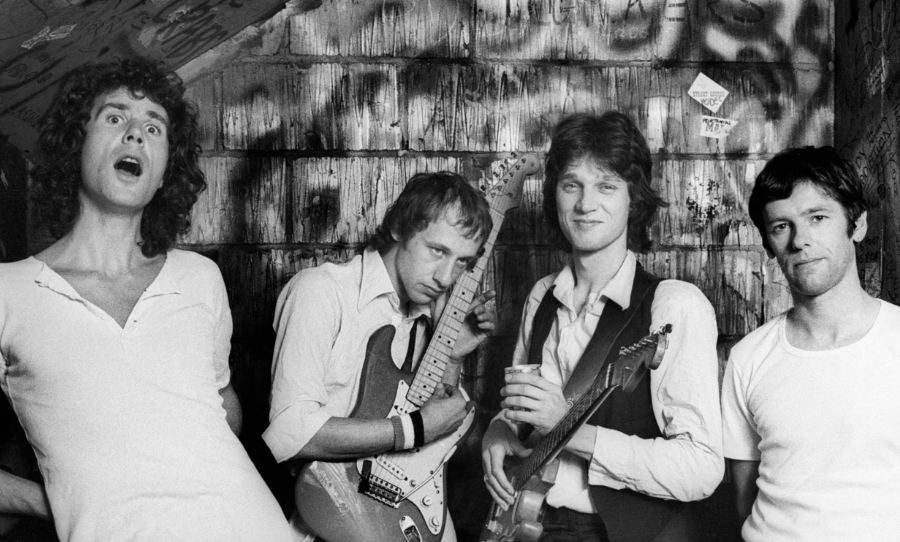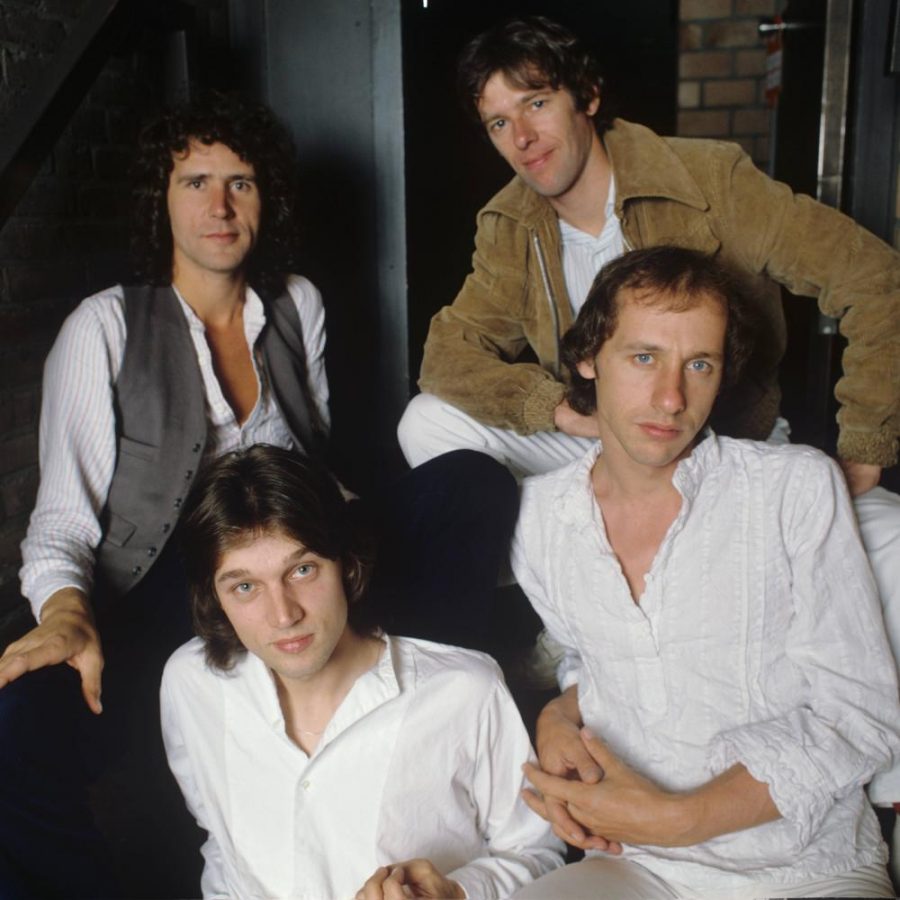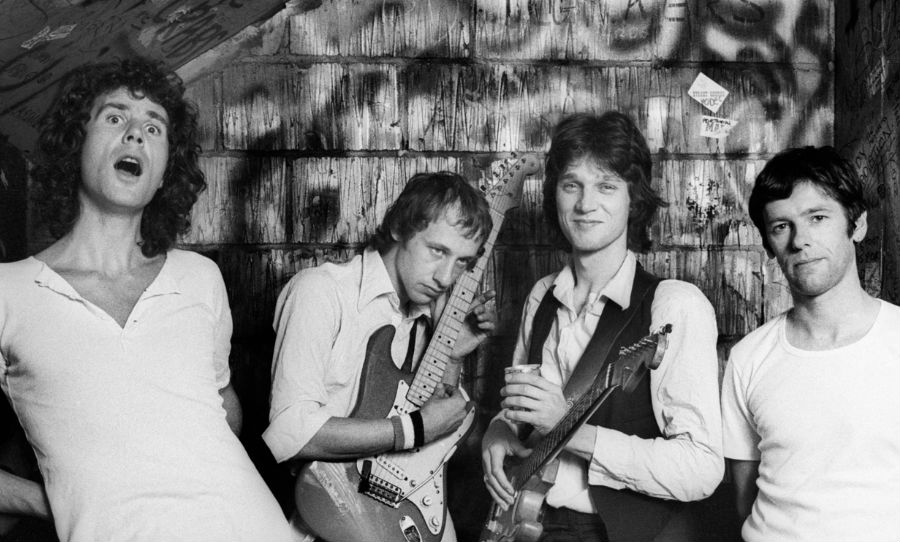One rainy night in Deptford, 1977, Mark Knopfler ducked into a deserted pub to avoid an approaching storm and possibly grab a beer in the meantime. A lousy jazz band were playing to an empty floor. Lacklustre and generally lacking in chops they failed to impress the few people that were there. Undeterred by the lack of both talent and punters, their lead singer finished the set with a mildly enthusiastic, “Goodnight and thank you. We are the Sultans Of Swing.”
While unsatisfied, Mark Knopfler left with the seed of an idea. A seed planted by a mediocre band had inspired a song that would become the biggest in the world, and one of Dire Straits’ best selling albums of all time.
Ironically, it was a lousy pub band that inspired Dire Straits’ debut, Sultans Of Swing, and arguably Mark Knopfler’s most mesmerising solo of all time.
Returning home to the Deptford council flat he was sharing with his younger brother David and bassist John Illsley, Knopfler began writing a song for the new band they’d just formed.
“We were living on next to nothing and weren’t even able to pay the gas bill,” Illsley says, clarifying that they weren’t called Dire Straits for nothing. “The first time I heard Mark playing a version of Sultans Of Swing was in that flat, but the song was completely different.”
Originally the song was written on a National Steel guitar in an open tuning – the same guitar seen on the cover of Brothers In Arms – though it was never performed that way. Knopfler felt like it lacked spark and set it aside. It wasn’t until he scrounged together enough money to buy a 1961 Stratocaster that the song was born again with an iconic, smouldering blues groove.
“The whole thing changed,” recalls Knopfler. “Though the lyrics remained the same. It just came alive as soon as I played it on that ‘61 Strat– which remained my main guitar for many years and was basically the only thing I played on the first album — and the new chord changes just presented themselves and fell into place.”
Illsley adds: “One day he said to me: ‘Remember that song I was fiddling about with the other day? I’ve completely redone the chord structure.’ He played it, and it sounded pretty good. The whole thing is incredibly simple, it’s the playing that makes it intriguing. It’s that rolling rhythm on the guitar and a very simple bass and drums approach. Then, of course, it’s a story. And let’s face it, all good songs have a story.”
Mark Knopfler expresses exquisite storytelling skills by folding the night’s events into the narrative. As the rain beats down, the band are ‘blowing Dixie, double four-time’– a style of jazz common in New Orleans, sometimes referred to as ‘hot jazz’. This is solidified in the ‘creole, creole’ lyric which refers to a music culture common in South Louisiana and characterised by large ensemble of brass and woodwinds.
Harry can ‘play the honky-tonk like anything’ giving up his day job to make the scene. So is guitar George who knows all the chords. Though, ‘It’s strictly rhythm he/Doesn’t want to make it cry or sing/They said an old guitar is all, he can afford/When he gets up under the lights to play his thing.’
There are also ‘A crowd of young boys they’re a foolin’ around in the corner’ who don’t ‘Don’t give a damn about any trumpet playin’ band/ It ain’t what they call Rock and Roll’, eloquently yet subtly depicting the decline of jazz in favour their contemporary rock gods.
Of course, the true magic of Sultans Of Swing is the blistering solo, defined by Mark Knopfler’s signature finger-picking technique.
“As for the actual solo, it was just more or less what I played every night,” he explains. “It’s just a Fender Twin and the Strat, with its three-way selector switch jammed into a middle position that gives it its sound, and I think there were quite a few five-way switches installed as a result of that song.”
Still desperately seeking a record deal, Dire Straits booked time at a small eight-track studio in July of ’77. They then took the resulting five demos to Radio London DJ, Charlie Gillett.
“Charlie went absolutely crazy about it,” Illsley remembers. “On-air he said: ‘I’m going to play this until somebody picks this band up,’ which I thought was quite a bold thing to do. And thankfully they did. In those days one person at a radio station could really make a difference.”
With the track on constant rotation, record executives one-by-one had their ears pricked and in two months Dire Straits were signed by Phonogram Records – later Mercury Records. They then entered Basing Street Studios to record their eponymous debut album, under the guide of producer Muff Winwood and engineer Rhett Davies.
Yet, as Illsley explains, “the problem we had was that we couldn’t get Sultans Of Swing to sound as good as the demo. There was even a time when the demo was being considered as the one that was going to go out as a single.” Eventually, they found a take that met everyone’s approval.
Released in May ’78, Sultans Of Swing didn’t gather much of a groundswell in Britain. The album dropped in October and sales slowly trickled in though it quickly went gold in Holland.
“I got this phone call from the record company saying that we’d sold 25,000 albums,” Illsley remembers. “Then it went to the States and took off there. The radio stations started playing Sultans Of Swing like crazy. And because America picked up on it, it came back to the UK and got re-released again, which was really peculiar. It started spreading like wildfire.”
After Sultans Of Swing was re-released, the success came almost immediately. The single reached No.8 on the UK Singles Charts, and 4th on the US Billboard Hot 100. Suddenly Knopfler was being hailed as the greatest homegrown guitarist since Eric Clapton. Bob Dylan even came knocking, recruiting Knopfler and drummer Pick Withers to play on Slow Train Coming.
Of course, Dire Straits went on to become one of the greatest rock bands of all time and when they retired in 1992, they’d racked up album sales over 120 million and taken home a handful of Grammys.
Musing on their turbulent beginning Illsley concludes: “People have said we were lucky, but I say: ‘Well, what does luck mean?’ The fact of the matter is that it was a bloody good song, the band was pretty damn good and we worked bloody hard. And the only way you’re going to get anywhere is by being committed. So if something like that happens to you, it’s fantastic. Boy, was it exciting!”
Check out the definitive live version of Sultans Of Swing below:



